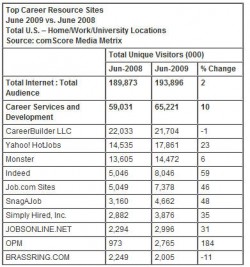 If there was any doubt, the announcement today by Simply Hired that it has attracted an additional $4.6 million in venture capital during one of the leanest economies in decades is testament to the potency of the job search engines.
If there was any doubt, the announcement today by Simply Hired that it has attracted an additional $4.6 million in venture capital during one of the leanest economies in decades is testament to the potency of the job search engines.
The money comes from IDG Ventures and Foundation Capital who, together with investments from News Corporation’s Fox Interactive Media, Garage Technology Ventures, and individual investors, brings to $22.3 million the capital Simply Hired has raised.
Today’s announcement also made a point of saying the jobs site is cash flow positive and has been for a year. The privately held company also announced that it has seen its revenue grow for each of the last 16 quarters.
 Its East Coast rival, Indeed.com, is also profitable, and both job sites now rank among the top-10 most trafficked job sites in the U.S. That’s no mean feat considering neither existed five years ago. Even accepting that it’s a lot easier for Simply Hired to achieve a 209 percent traffic jump, as it did in 2008, than it is for CareerBuilder, Monster, or HotJobs to do the same because of their much higher starting point, the year-in and year-out growth for Indeed and Simply Hired has been nothing short of remarkable.
Its East Coast rival, Indeed.com, is also profitable, and both job sites now rank among the top-10 most trafficked job sites in the U.S. That’s no mean feat considering neither existed five years ago. Even accepting that it’s a lot easier for Simply Hired to achieve a 209 percent traffic jump, as it did in 2008, than it is for CareerBuilder, Monster, or HotJobs to do the same because of their much higher starting point, the year-in and year-out growth for Indeed and Simply Hired has been nothing short of remarkable.

Nor is this a matter of simply buying traffic. Neither site had the investment dollars to match what CareerBuilder did in 2003 when it outbid Monster and signed traffic deals with AOL and MSN that were worth up to $265 million. Instead, both Simply Hired and Indeed have put together networks of redistribution partners who carry some or all of the job listings the two sites cull from the Internet. In fact, it is because of the listings provided by the aggregators that some job boards have any listings at all.
The success the job search sites have had — especially in making sales — suggests that the predictions about the demise of job boards are overblown. When Indeed and Simply Hired first made their appearance, the obvious question was, “How does a site that aggregates listings from others and makes them available for free survive?” Both sites — and the handful of others out there doing the same thing — have answered that question with pay-per-click listings, employer traffic drivers, and some minor additional ad forms.
While neither company releases financial information, at least at Simply Hired the revenue is sufficiently ample to fund a staff of 50, according to the announcement. The new investment dollars will allow for increasing that to 80 this year.
Both Indeed and Simply Hired have expanded beyond the U.S. Simply Hired now operates in 13 countries, including Australia, Canada, France, Germany, India, Spain, and the United Kingdom. Some of the $4.6 million will fund further expansion.
Indeed has a presence in Australia, Belgium, Brazil, Canada, France, Germany, India, Ireland, Italy, Mexico, Netherlands, Spain, Switzerland, and the UK.
“Job search is a global problem, and Simply Hired is committed to reaching both active and passive job seekers globally at both SimplyHired.com and at other online destinations through our network,” said Gautam Godhwani, co-founder and CEO at Simply Hired. “IDG Ventures enables Simply Hired to continue to expand its international footprint with additional resources and facilitates our relationship with the global network of 450 IDG online properties.”
In fact, it may well be the partner properties that IDG brings to the table that will, in the long run, prove more valuable than its money. Broadening the reach of Simply Hired not only means more and diverse traffic, but it provides an appeal to multinational employers whose hiring is global and whose choices to reach overseas markets are nowhere near as extensive as they are for the U.S. market.